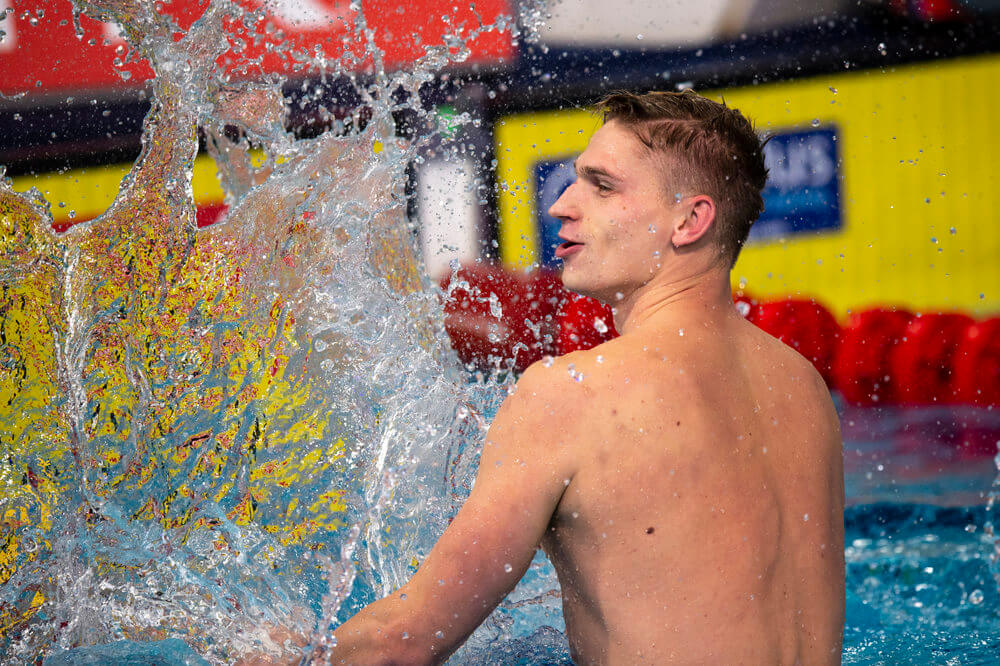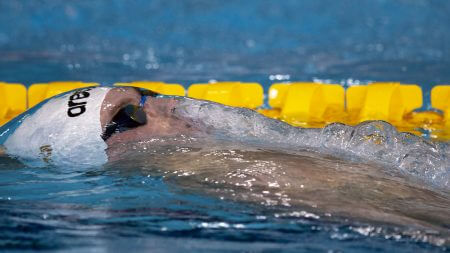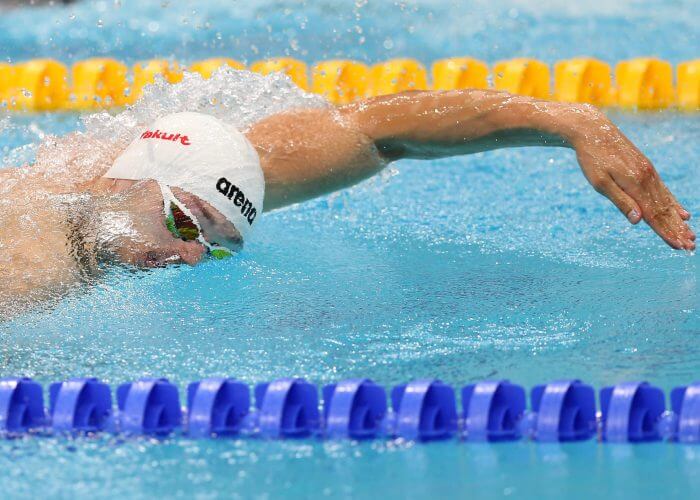Radoslaw Kawecki & Kacper Majchrzak Are Hoping to Lead Polish Olympic Swim Team to Historic Year

Radoslaw Kawecki had everything going his way leading into the 2016 Olympic Games. After finishing fourth in the 2012 London Games in the 200 backstroke, he won the silver in 2013 at the World Championships with a best time and new European record. In 2014, he was European champion. And in 2015, he was the Worlds silver medalist again.
Heading in to 2016, he was a medal favorite after swimming through the European championships with his third straight 200 back gold. But in Rio, he took it too easy in the heats and finished 17th. He was out of the semi finals and his dream of winning an individual medal in the prime of his career was over.
“The biggest lesson was not overthinking the race in prelims,” Radoslaw Kawecki said through a translator while on a training camp in Fort Lauderdale with members of the Polish national team. “I miscalculated in Rio and swam too slow in the morning. So the big lesson heading into Tokyo will be to have a good morning session.”
In 2017, more disappointment came after he missed the semi-finals again in the 200 back at the World Championships. Things started to look up in 2018 when he got second at the European Championships in the 200 back. The silver that summer snapped his gold medal winning streak in that event at Europeans, but after two straight years of disappointments, it was good to be back among the world’s elite.
Flash forward to 2019 where he found himself in the final at the World Championships in the 200 back again. Swimming in lane 1, he finished in fourth place with a 1:56.37, well off his best time of 1:54. But being back in the World Champs final provided a big boost in motivation and belief that he could still fight for a podium spot in Tokyo.
And to top it all off, he won the European short course championships this past December for his first gold medal on an international stage since the 2016 World short course championships.
“I was stoked to be back on top,” Kawecki said. “The only thing I was not super happy about was the time. I’ve been faster before but I was super happy being European champion.”

Radoslaw Kawecki breaks the surface at the 2019 European short course championships in Glasgow. Photo Courtesy: Patrick B. Kraemer
Kawecki is back among the world’s best in the 200 back, ready to fight alongside European rival and two-time reigning World champ Evgeny Rylov of Russia, as well as reigning Olympic champion Ryan Murphy of the United States at the Olympic Games.
But Kawecki has not qualified for Tokyo just yet, with that chance coming at the Swedish Open in April, and at the European Championships in May that will be in Budapest.
Kawecki is training very similarly now to what he was doing leading up to the Rio Games with the only change being his out of the pool training, incorporating more dryland and strength training to his regimen, believing that was one of his biggest weaknesses four years ago.
This year he is the oldest one on the Polish national team at 29, approaching what would be his third trip to the Games. He brings a lot of experience to the table as the younger swimmers look up to him. And Kawecki believes this is the strongest team that Poland has had in recent years.
Radoslaw Kawecki is a part of 17 Polish swimmers on a training trip to Fort Lauderdale, Florida this week. Also on deck with him is freestyler Kacper Majchrzak, who is 27, and is also aiming for a spot on what would be his third Olympic team. Majchrzak primarily swims the 100 and 200 free and is shooting for the Olympic qualification standard of 1:47.02 and 48.50 at the Swedish Open in April.

Kacper Majchrzak at the 2017 Worlds in Budapest. Photo Courtesy: SIPA USA
In London 2012, he only swam on the 4×100 medley relay team that was 16th. In Rio, he made his individual debut in the 200 free where he set a Polish record of 1:46.30. But he finished in 10th place in the semi-finals and missed the final by 0.07.
“I learned all moves and all details are important,” Kacper Majchrzak said of what he learned from missing the 200 free final by such a close margin. The experience of being in that environment is what he believes will help him achieve his goals in Tokyo.
“You must focus from start to end. I know how this competition is and it has all the best athletes in the world. They’re all together and living in the village and it is the most important competition for four years. I know what the feeling is and I think this experience can help me in Tokyo.”
Like Kawecki, Majchrzak has had a couple bumps in the road since Rio, not performing up to his best in the recent World Championships. He missed semi finals in the 200 free in Gwangju, placing 23rd with a 1:48.0, and was 19th in the 100 free at 48.8. But he has made changes in his training in recent years to accommodate his aging body, doing shorter practices with more rest and more intensity with equal importance on the 100 and 200 free.
Majchrzak hopes to lead Poland to appearances in the final of the 4×100 and 4×200 free relays in Tokyo this summer, as the team solidified their spot in Tokyo by placing in the top 12 at the 2019 World Championships.
“We have 11th and 12th places. So it was ok,” Majchrzak said of the relays. “We qualified, but it’s not the final. I think the final is the moment where we can be happy.”
Poland has a relatively young core in the freestyle relays with the presence of 19-year-old Jakub Kraska as well as rising star Karol Ostrowski, who will be swimming in the US next year at Florida State.
“They are very young swimmers but swim very fast,” Majchrzak said of Kraska and Ostrowski. “It is very nice and it is helping me to swim better because we compete in training. This atmosphere and these young swimmers can help us grow and it motivates us.”
The Polish team has a fair number of teenage swimmers that bring a good mix with the veterans on the team like Radoslaw Kawecki (29), who said being around the younger swimmers has helped him become more responsible. Majchrzak (27), Filip Zaborowski (25) and Jan Switkowski (26) also bring a lot of experience to the team that is meshing well as one unit.
“I think that all the people are training very hard so I keep fingers crossed for all the team,” Majchrzak said. “I think that some young swimmers will qualify for (Olympics) first time and there’s a big chance for their career to develop.”
Majchrzak also took part in the first season of the International Swimming League with Polish teammates Kawecki, Switkowski and Kasia Wasick on the Cali Condors. They were the only Polish swimmers to swim in the entire league and they all ended up on the same team thanks to Switkowski’s recommendation, who had trained under head coach Gregg Troy at the University of Florida.
“It was very good,” Majchrzak said of the league. “I am very happy because I can see how American swimmers do this and this experience was really cool.
“It is really good atmosphere for all the best athletes in the world. They want to grow this ISL to be bigger and important in swimming and everything is built a special atmosphere.”
As veterans of the Polish national team, Kacper Majchrzak and Radoslaw Kawecki are hoping to lead their country to great success at the Olympic Games this summer. After having no finalists show in Rio, it was a big disappointment for the European nation.
“We have goal to catch the dreams,” Majchrzak said. “Finals and medals will be very good for Polish team but we can be happy for personal bests and swim good times.”
“We used to train separately and now we train more as a group,” Kawecki said. “Before London (2012), we had a similar setup to this and it worked well.”
That setup includes a two-week camp in Florida where the large group spends a lot of time together similar to an American college team on a training trip. While in Florida, some of the team drove to Miami to attend a Miami Heat basketball game and some drove up to the Kennedy Space Center in Merritt Island. The training camp is helping them get closer as a team rather than just a group of individuals.
The Pols are roughly eight weeks away from their qualification meet at the Swedish Open in April, and will also be sending a strong team to the European Championships in May. Although medals are the ultimate goal, the Polish team is just focusing on improving themselves and they think this year will be one of the best yet for the country in swimming.



